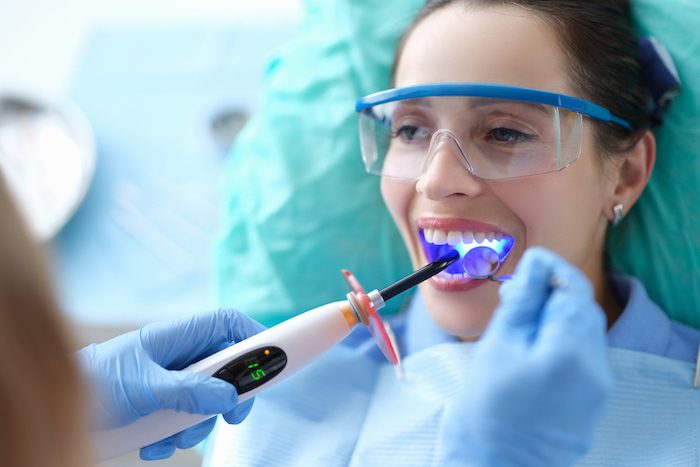Teeth bonding is an excellent treatment option for children and adults looking to conceal minor blemishes on their dental structures. Children benefit from teeth bonding when they have minor imperfections on their baby teeth. The teeth bonding procedure is minimally invasive and will help restore your child’s beautiful smile until their tooth falls out and is replaced by a permanent tooth.
Adults can also benefit from this cost-effective solution by quickly concealing minor imperfections, preventing their smiles from being uniform. Learn more about our teeth bonding services below.
Teeth Bonding in Suffolk, VA
Dr. Steve Gwaltney, Dr. J. Ryland Gwaltney, and Dr. Whitney Gwaltney are passionate about cosmetic dentistry in Suffolk, VA. They have helped many children and adult patients improve their smiles using tooth-bonding solutions.
Teeth bonding allows our doctors to provide a minimally invasive, cost-effective solution to concealing minor imperfections on your teeth. As long as the issues you are trying to conceal are not severe or impeding the functionality of your smile, teeth bonding can be used to cover up minor issues and restore the look of your smile.
What Dental Concerns Can Dental Bonding Treat?
Dental bonding is a simple and helpful way to fix many tooth problems. Our dental team may use bonding for any of the following dental concerns:
- Chipped or Cracked Teeth: If you have a small chip or crack in your tooth because you bit on something hard or had a minor accident, dental bonding can help. Your dentist will use a composite resin material that looks like your tooth to fill in the broken part. Dental bonding makes the tooth look whole again.
- Gaps Between Teeth: Some people have small spaces or gaps between their teeth that they might not like. Bonding can fill in these gaps and make your teeth look closer together, giving you a nice, even smile.
- Tooth Discoloration: Sometimes, teeth can get discolored or stained from things like coffee, tea, red sauce, or aging. Bonding can cover these stains and make your teeth look whiter and healthier.
- Teeth That Look Too Short: If some of your teeth are shorter than others, bonding can add some material to the ends of these teeth. This helps them look longer and more like the rest of your teeth.
- Misshaped Teeth: If a tooth doesn’t have the proper shape, bonding can fix that too. Your dentist can mold the bonding material to make the tooth look like a normal shape again.
Dental bonding is an easy and fast way to fix several dental concerns, making smiles look brighter and more even.
The Tooth Bonding Procedure
Your Suffolk, VA dentist can complete the tooth bonding procedure in one visit. It is a minimally invasive, conservative treatment used for many dental concerns. The first thing your dentist will need to do is prepare the tooth. This involves removing a minimal amount of tooth structure and then applying a conditioning liquid.
Teeth bonding uses a tooth-colored resin material, similar to what is used during dental fillings. Once we prepare the tooth, we apply the resin material evenly over the imperfection on the tooth that you are trying to conceal. It is sculpted into the desired shape by hand. Then, it is hardened to your dental structures using ultraviolet light.
Once complete, your doctor will file down the material to ensure it blends in against your tooth and is not interfering with your bite pattern. This process is minimally invasive, and many patients do not require numbing solutions while undergoing this treatment.
You can’t treat some dental concerns using teeth bonding. Your doctor will evaluate your dental concerns and determine if bonding is the appropriate approach or not. While we are happy to conceal minor imperfections using teeth bonding, we do not want to cover up major concerns like severe chips or cracks that could lead to future issues or discomfort. Rest assured that we will keep the best interests of your future dental health in mind when offering you a treatment option.
If your dentist decides your dental concern is too severe for a simple bonding treatment, they may recommend another more permanent treatment, such as a dental crown or porcelain veneer.
Best Practices to Care for Bonded Teeth
Taking care of bonded teeth is simple if you follow some basic steps. First, brush your teeth two times a day using a soft-bristled toothbrush to prevent damage. Use a non-abrasive toothpaste to keep the bond intact and your teeth and gums healthy.
You must floss between your teeth at least once a day to remove food and debris. Try not to bite down on hard objects like ice or pencils, as this can chip the bonded areas. Also, limit foods and drinks that can stain, such as coffee or red wine. Finally, visit our office on a regular basis for check-ups to make sure your bonded teeth stay healthy and strong.
Tooth Bonding FAQs
Dental bonding is one of the most popular dental solutions. Read on to learn more about tooth bonding by reading the answers to these frequently asked questions.
How long does it take dental bonding to cure?
On average, dental bonding takes 30-60 minutes to place. Then, as soon as the dentist activates the hardening process, your bond will cure immediately. Thus there is no wait time for it to settle, and you can use your teeth as soon as you leave the office.
How long after bonding can I eat?
After dental bonding, you do not have to wait to eat or drink. Bonding cures immediately, so eating or drinking directly after your appointment is completely safe. However, you should know that you may experience slight tooth sensitivity to heat and cold after bonding.
Does bonding stain easily?
Dental bonding is an effective procedure, but the material can easily stain. Dental bonding can change the look of your teeth by making them appear darker than the surrounding tooth structure. This is because composite resin is very susceptible to discoloration.
Does tooth bonding break easily?
Composite bonding does not break or very seldom comes off. The most frequent causes of composite bonding chipping include biting and chewing on hard foods and teeth grinding. If you know that you grind your teeth, bonding may not be the best cosmetic procedure for you.
How many times can you bond a tooth?
You can bond as many times as you’d like as long as your tooth has the necessary structure. The more times you bond to a tooth, the more likely it is that the tooth may deteriorate, so too much bonding may eventually cause your tooth to require a crown.
Is tooth bonding reversible?
Yes, a dentist can remove tooth bonding if necessary. Moreover, a dentist can remove the bonding material without harming the underlying tooth. However, if the bonding has been in place for years, the tooth might appear different after removal due to wear or discoloration.
Will I need anesthesia for the dental bonding procedure?
You might need local anesthesia during a dental bonding procedure, but some people do not need it. Whether or not you need a local anesthetic really depends on the details of your treatment and how sensitive your teeth are. Your dentist will talk with you and decide what’s best so you feel comfortable during the procedure.
How is dental bonding different from porcelain veneers?
Both dental bonding and veneers can improve your smile, but they are different treatments. They differ in materials and process. Teeth bonding involves putting a tooth-colored resin on your tooth to fix small issues like chips or gaps quickly. Bonding is also cheaper than teeth veneers. Your dentist can complete the treatment in one visit. Porcelain veneers, on the other hand, are thin shells made from long-lasting porcelain. Teeth veners cover the front of teeth for a more dramatic change. Porcelain veneers need more than one visit to complete and will last much longer than bonding.
Request a Dental Exam Today
If you want to learn more about how teeth bonding can help you improve your smile aesthetics, schedule a cosmetic dentistry consultation with our experienced doctors at Gwaltney Dental. We look forward to seeing you soon and helping you achieve a beautiful and healthy smile.

